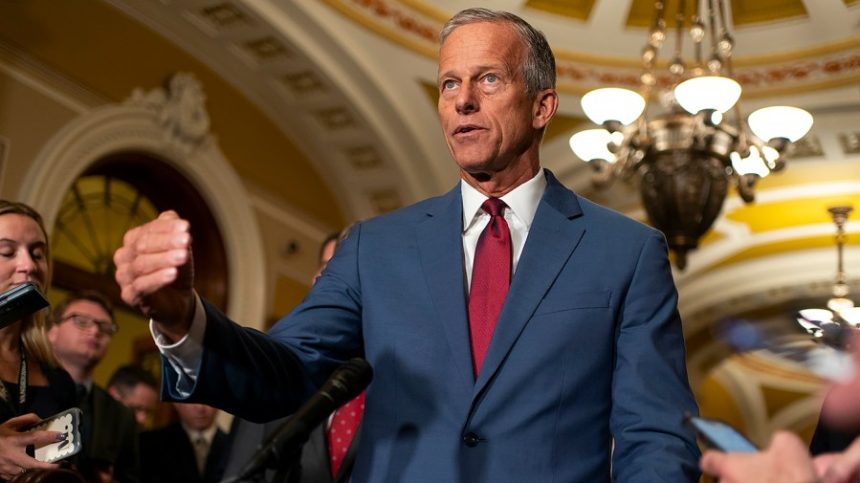Senate Republicans confirmed four dozen of President Trump’s nominees Thursday, the first tranche of his stalled choices to get over the finish line after the GOP changed the chamber’s rules last week to break a months-long blockade put up by the Democrats.
After weeks of warnings, Republicans late last week pulled the trigger on the “nuclear option,” allowing lawmakers to confirm lower-level nominees en bloc. That led to Thursday, when the Senate voted 51-47 to cement 48 nominees into place.
“Republicans have fixed a broken process and restored the Senate precedent that applied to previous presidents — and that is allowing … a majority of a president’s nominees to be confirmed expeditiously,” Senate Majority Leader John Thune (R-S.D.) said on the floor.
“Today is the first slate of nominees. There will be more to come,” he said. “And we’ll ensure that President Trump’s administration is filled at a pace that looks more like those of his predecessors.”
All 48 of the nominees in this batch advanced out of committee with bipartisan backing, with many of them slated for under or assistant secretary positions across the government.
A half-dozen ambassador nominees were also part of the tranche. Kimberly Guilfoyle for Greece and Callista Gingrich for Switzerland and Liechtenstein are among the most notable names.
The rule change took place after weeks of internal GOP discussions and in the wake of failed negotiations on a bipartisan nominations package prior to the August recess.
It also came after Thune and his colleagues railed for months about Democrats’ unwillingness to consider any Trump nominee for passage via unanimous consent or voice vote. Democrats had forced Republicans to use up the entire clock in order to pass any Trump nominee, except for Secretary of State Marco Rubio in January.
Republicans considered a number of avenues but settled on the en bloc effort as they determined it was the quickest way to clear the deck of nearly 150 lower-level nominees that remained stalled out.
The GOP rule change was based on a proposal offered by Sens. Amy Klobuchar (D-Minn.) and Angus King (I-Maine) two years ago. Theirs would have allowed 10 nominees from an individual committee to be considered together and passed in a single vote. The change Republicans approved doesn’t have a cap on the number of nominees in a bloc.
The alteration does not allow judicial nominees to be included in an en bloc package. They still have to be processed individually.
Roughly 125 nominees are still awaiting votes, which are expected in the coming weeks.
The GOP’s move last week also marked the latest instance of the majority party reforming the rules in order to grease the skids and advance key nominees.
Former Senate Majority Leader Harry Reid (D-Nev.) issued the opening salvo in 2012 by lowering the threshold needed to approve executive branch and judicial nominations, except for Supreme Court nominees.
Then-Senate Majority Leader Mitch McConnell (R-Ky.) responded five years later by including Supreme Court nominees to those who only needed 51 votes. Two years later, he also moved to lower the amount of debate time for lower-level nominees from 30 hours to the current two-hour mark.
Copyright 2025 Nexstar Media, Inc. All rights reserved. This material may not be published, broadcast, rewritten, or redistributed.
For the latest news, weather, sports, and streaming video, head to The Hill.









